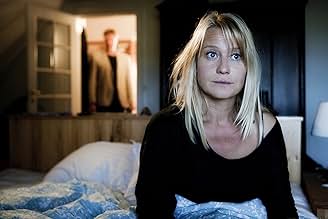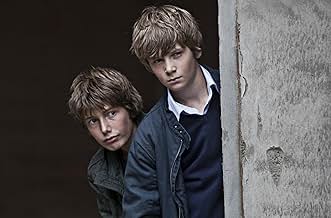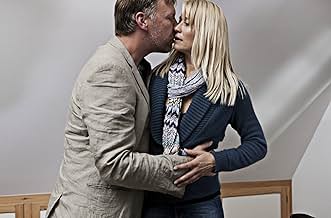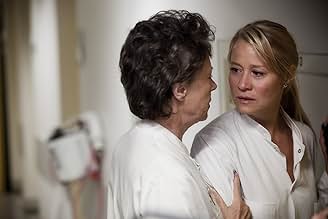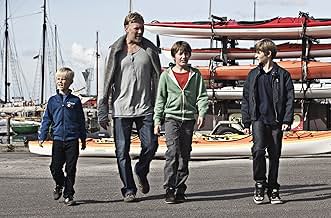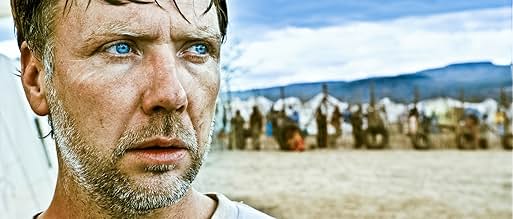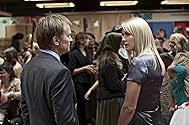IMDb-BEWERTUNG
7,6/10
42.551
IHRE BEWERTUNG
Die Leben zweier dänischer Familien kreuzen sich, und es entsteht eine außergewöhnliche, aber gefährliche Freundschaft. Einsamkeit, Verletzlichkeit und Leid sind nicht weit.Die Leben zweier dänischer Familien kreuzen sich, und es entsteht eine außergewöhnliche, aber gefährliche Freundschaft. Einsamkeit, Verletzlichkeit und Leid sind nicht weit.Die Leben zweier dänischer Familien kreuzen sich, und es entsteht eine außergewöhnliche, aber gefährliche Freundschaft. Einsamkeit, Verletzlichkeit und Leid sind nicht weit.
- 1 Oscar gewonnen
- 14 Gewinne & 24 Nominierungen insgesamt
Wil Johnson
- Najeeb
- (as Will Johnson)
Eddy Kimani
- Patient
- (as Eddie Kimani)
Mary Ndoku Mbai
- Patient
- (as Mary Nduku Mbai)
William Jøhnk Nielsen
- Christian
- (as William Jøhnk Juel Nielsen)
Satu Mikkelinen
- Hanna
- (as Satu Helena Mikkelinen)
Empfohlene Bewertungen
This movie is a far more direct and disturbing probe into some of our more troubling inclinations than anything I've seen since becoming a fan of Lars von Trier's movies. The topic here is vengeance and its consequences, more or less. I was a little surprised to find it had been directed by a woman, Susanne Bier. I've always thought women would be good at this kind of near melodrama but have never actually seen one tackle such a project, to my knowledge. The story centers around two boys and their developing reaction to first school house bullying, but then a much more serious instance of it in their home life. The acting is beautifully done and none of the leads seem to have held back in the slightest. One dad is a doctor who, it appears, donates his services to a part of Africa wrought with violence. Despite his obvious good nature, he and his wife, also a doctor, are having problems.
It's unusual in my experience to have a woman show just how much more selfless a man might be than his wife, but that is exactly what is done here. And it's quite refreshing. But the sweep and breadth of this movie is quite satisfying on its own, spanning from Africa to modern day Denmark. This is a trip I wouldn't hesitate recommending to anyone.
It's unusual in my experience to have a woman show just how much more selfless a man might be than his wife, but that is exactly what is done here. And it's quite refreshing. But the sweep and breadth of this movie is quite satisfying on its own, spanning from Africa to modern day Denmark. This is a trip I wouldn't hesitate recommending to anyone.
Saw this in Toronto and it remained with me for days afterward. Shattering filmmaking! The size and elegance of a Hollywood big budget, with the honesty and challenge of an indy. The performances, especially those of the two boys, are riveting, but I was also impressed with the deep focus photography, the haunting score. Went to see this because I had so enjoyed After the Wedding - but feel this is even better. Only the ending conflict resolution is, perhaps, a little too easy-- but not unearned. And oh boy, was I grateful for it. I want to see this with my son, because I want him to experience the moral and emotional snake pit Bier and her screenwriter toss us into: every guy --no matter what age-- will get it, and none of us will like it very much. To me, Bier speaks about what it SHOULD mean to be a man. Is vengeance built into our genes? I hope not. And I hope this wins the Academy Award this year, and everybody in America goes to see it.
Like anything, people will offer their own view of things. This is my own.
There are many films out there that focus on bullying and its effect on the children that experience it. A few will go further to picture the consequences to those children as they become adults, some of whom will never overcome that.
But it was the first time, from my perspective, that a film ventures to show bullying by an adult. As the stories (in Africa and in Denmark) run in parallel, it makes one wonder what the child bully would become if he were not stopped.
Brilliantly told, it left me with a sense that in our days we are still not taking bullying as seriously as we should. So how can the bullies ?
There are many films out there that focus on bullying and its effect on the children that experience it. A few will go further to picture the consequences to those children as they become adults, some of whom will never overcome that.
But it was the first time, from my perspective, that a film ventures to show bullying by an adult. As the stories (in Africa and in Denmark) run in parallel, it makes one wonder what the child bully would become if he were not stopped.
Brilliantly told, it left me with a sense that in our days we are still not taking bullying as seriously as we should. So how can the bullies ?
After his mother's death, Christian moves once again, and starts in a new school. He meets Elias, and defends him against bullies. The latter's father works as a doctor in Africa, with a sadistic crime lord nearby. And so we have the setting for a drama exploring revenge, as well as power struggles, loss and fear. The overall moral isn't going to surprise anyone(and it isn't entirely consistent), and this does occasionally stoop to a cliché. However, it remains a gripping and effective film, and it manages to interject a lot of insight and truth, seeing situations from multiple different perspectives. This is the second movie by Bier that I watch, and I am confirmed in my assertion that Things We Lost in The Fire was a fluke, and not representative of her level of talent(it should be noted that the main problem with that one was the script, and she had nothing to do with that). She abandons the eyeball shots, and there is much rejoicing. The camera is close at times, though no longer oppressively so. This has a cinematography similar to the show NCIS, with hand-held cameras. I didn't feel like the nature footage added anything, at least not that of Denmark. The editing puts you right there, without being annoying or particularly drawing attention to itself. This is written by the man behind Den Du Frygter, Mørke and Blinkende Lygter(and other famous ones, but those are the ones I've seen and liked), and his skill and credible, human characters(that are the focus) shines through. Everything is set up, and most of it pays off. The acting is excellent, without exception, the kids especially. Our half-way orphaned lead captures every look and movement to perfection, and they really did find someone who could be Thomsen's son. Bodnia returns to a typecast role for him, and delivers. The vast majority of the humor works, and nearly none of it detracts from the serious and important subject. Everyone can recognize the little brother in someone they do or have known. The music is appropriate and not distracting. Dialog is great. No soap opera moments, it all comes across as entirely genuine, and nothing comes out of the blue. The tone is mature and honest; we don't feel preached to, or lectured, this respects its audience and honestly understands what it has to say, it isn't merely repeating a mantra. There is gore(think ER) and disturbing content in this. I recommend it to anyone that this at all appeals to. 8/10
This film is recommended.
"For every action, there is an equal and opposite reaction."
Two Danish families, worlds apart in their ideologies and circumstances, come together in Suzanne Bier's Oscar winning foreign film, In A Better World. Screenwriter Anders Thomas Jensen takes two parallel stories about parallel lives that converge. Although the screenplay doesn't consistently mesh the duality of its concept, with scenes of African turmoil in sharp contrast with idyllic Danish villages, it does provide thought provoking mediation about the subject of revenge and its impact on violence, death, and day-to-day hardships faced by some minorities in our global realm.
Family No. 1: Anton (Mikael Persbrandt), a Swedish doctor who works in Sudan treating victim of war crimes, tries to be a principled and ethical pacifist, an idealist lost in an ungodly world. He confronts conflict at work and in his private life as his marriage to Marianne (Trine Dyrholm) is floundering. His son, Elias (Markus Rygaard), is dealing with bullying at school and his parents' possible divorce at home.
Family No. 2: Claus (Ulrich Thomsen), a recently widowed and grieving father and his son, Christian (William Johnk Nielsen), who blames his father for his mother's death and cannot adapt to the loss of his mother. Both troubled souls move from London to start a better life.
When Christian defends Elias from the school bully, both boys become instant friends and begin a dysfunctional bonding to survive a world that they perceive as riddled with injustice. Later, an disturbing incident occurs between Anton and another parent which triggers the two boys into righting a wrong in a most extreme way. No longer wanted to be victims, they instead become the oppressors.
Complex issues abound in this film. At some point, each character's action causes an act of retribution, a penalty for their misconduct, but not always the most deserving of punishments. In this unfair world of ours, the turning of a cheek may result in injury rather than reward. Karma is at work and actions decide our fate. We witness the ill treatment of people victimized with global acts of mistreatment and persecution in each country and are unprepared for the film's stark reality. It is the universal atrocities that prevails in our lives that rankles the core of this film and give the film its undeniable power.
This is definitely a Message Movie with a capital M, although sometimes the message is a mixed blessing, becoming a sermon at the pulpit in Bier's skillful hands. The scenes from Africa seem a bit heavy-handed and just don't correlate with the majority of the more interesting story set in Denmark. It also becomes a tad melodramatic in the end. Yet, one has to admire the noble effort and deeper personal vision of this film as it tackles major issues that are so scarce in today's cinema. The acting, especially the young actors, is exceptional.
In A Better World could have been a better film if the story would have concentrated more with the family dynamics and the psychological effects that compound a child's indefensible adult world. But Bier's film is still one of the better example of filmmaking that will more that satisfy the intellectual and more serious-minded moviegoer today. GRADE: B
NOTE: Visit my movie blog for more reviews: www.dearmoviegoer.com
"For every action, there is an equal and opposite reaction."
- Isaac Newton
Two Danish families, worlds apart in their ideologies and circumstances, come together in Suzanne Bier's Oscar winning foreign film, In A Better World. Screenwriter Anders Thomas Jensen takes two parallel stories about parallel lives that converge. Although the screenplay doesn't consistently mesh the duality of its concept, with scenes of African turmoil in sharp contrast with idyllic Danish villages, it does provide thought provoking mediation about the subject of revenge and its impact on violence, death, and day-to-day hardships faced by some minorities in our global realm.
Family No. 1: Anton (Mikael Persbrandt), a Swedish doctor who works in Sudan treating victim of war crimes, tries to be a principled and ethical pacifist, an idealist lost in an ungodly world. He confronts conflict at work and in his private life as his marriage to Marianne (Trine Dyrholm) is floundering. His son, Elias (Markus Rygaard), is dealing with bullying at school and his parents' possible divorce at home.
Family No. 2: Claus (Ulrich Thomsen), a recently widowed and grieving father and his son, Christian (William Johnk Nielsen), who blames his father for his mother's death and cannot adapt to the loss of his mother. Both troubled souls move from London to start a better life.
When Christian defends Elias from the school bully, both boys become instant friends and begin a dysfunctional bonding to survive a world that they perceive as riddled with injustice. Later, an disturbing incident occurs between Anton and another parent which triggers the two boys into righting a wrong in a most extreme way. No longer wanted to be victims, they instead become the oppressors.
Complex issues abound in this film. At some point, each character's action causes an act of retribution, a penalty for their misconduct, but not always the most deserving of punishments. In this unfair world of ours, the turning of a cheek may result in injury rather than reward. Karma is at work and actions decide our fate. We witness the ill treatment of people victimized with global acts of mistreatment and persecution in each country and are unprepared for the film's stark reality. It is the universal atrocities that prevails in our lives that rankles the core of this film and give the film its undeniable power.
This is definitely a Message Movie with a capital M, although sometimes the message is a mixed blessing, becoming a sermon at the pulpit in Bier's skillful hands. The scenes from Africa seem a bit heavy-handed and just don't correlate with the majority of the more interesting story set in Denmark. It also becomes a tad melodramatic in the end. Yet, one has to admire the noble effort and deeper personal vision of this film as it tackles major issues that are so scarce in today's cinema. The acting, especially the young actors, is exceptional.
In A Better World could have been a better film if the story would have concentrated more with the family dynamics and the psychological effects that compound a child's indefensible adult world. But Bier's film is still one of the better example of filmmaking that will more that satisfy the intellectual and more serious-minded moviegoer today. GRADE: B
NOTE: Visit my movie blog for more reviews: www.dearmoviegoer.com
Wusstest du schon
- WissenswertesThe Danish title 'Hævnen' translates into English as 'Revenge'. Susanne Bier mentioned that she prefers the English title 'In a Better World' which emphasizes the hopefulness of the film while the Danish title emphasizes the severeness of the film (at 1:52:49 in the Blu-ray director's commentary).
- PatzerWhen Anton (Michael Persbrant) performs his first surgery he scratches his head/corrects the position of his mask after having put on sterile gloves (at around 42 mins) thereby contaminating them and risking that the patient gets infected. A real surgeon would never do this, and if she or he did, she or he would change gloves.
- VerbindungenFeatured in DR2 Premiere: Folge #4.1 (2010)
Top-Auswahl
Melde dich zum Bewerten an und greife auf die Watchlist für personalisierte Empfehlungen zu.
- How long is In a Better World?Powered by Alexa
Details
- Erscheinungsdatum
- Herkunftsländer
- Offizielle Standorte
- Sprachen
- Auch bekannt als
- In a Better World
- Drehorte
- Produktionsfirmen
- Weitere beteiligte Unternehmen bei IMDbPro anzeigen
Box Office
- Budget
- 5.500.000 $ (geschätzt)
- Bruttoertrag in den USA und Kanada
- 1.008.098 $
- Eröffnungswochenende in den USA und in Kanada
- 33.058 $
- 3. Apr. 2011
- Weltweiter Bruttoertrag
- 13.004.504 $
- Laufzeit1 Stunde 58 Minuten
- Farbe
- Sound-Mix
- Seitenverhältnis
- 2.35 : 1
Zu dieser Seite beitragen
Bearbeitung vorschlagen oder fehlenden Inhalt hinzufügen

Oberste Lücke
By what name was In einer besseren Welt (2010) officially released in Canada in French?
Antwort

